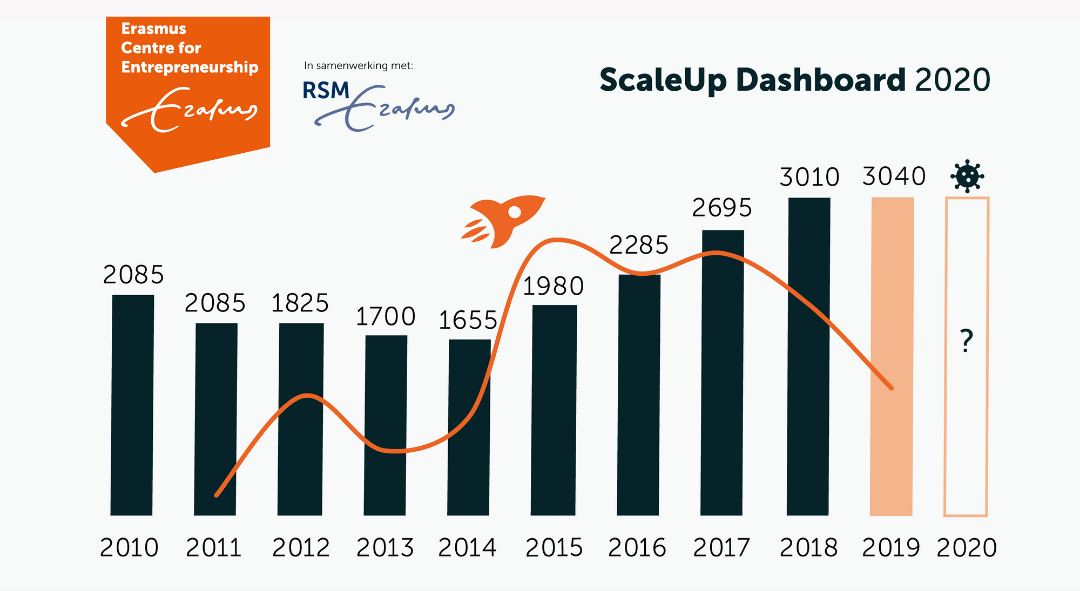Scaleups in times of crisis
Download the full report ”Scaleups in times of crisis” here for the English version and here for the Dutch version
Will Dutch scaleups survive the coronacrisis?
A few weeks ago, we published the ScaleUp Dashboard 2020, the most recent edition of our annual publication about the Dutch business climate for scaleups. The latter, also known as fast-growing companies, are an important indicator of the resilience of an economy. Scaleups are an engine for job creation – in the Netherlands they created 230,000 jobs in the three years between 2017 and 2019 – and are responsible for bringing innovation on the market. Unfortunately, the main results of the ScaleUp Dashboard 2020 were not as encouraging as we were used to. After a couple of years of economic prosperity, the growth in the number of scaleups in the Netherlands seems to have come to halt in 2019. Moreover, it appears to have become more difficult for Dutch startups to grow into a scaleup and for young scaleups to survive the so-called ‘’Second Valley of Death’’ between the 5th and the 10th year of their existence, when two thirds of them loses their high-growth.
These are the economic conditions within which the Netherlands entered the third decade of the twenty-first century. However, recent history taught us, 2020 has not been just another year for our economy. The explosion (in multiple waves) of the COVID-19 global pandemic and the constrictive measures we have adopted to contain it, have drastically impacted our economy; first, paralysing supply, later abating demand and, consequently, affecting the job market. Certain sectors of our economy in particular (think of the catering or the travelling industry) have been dramatically hit; others have in fact been thriving, e.g. e-commerce. Major economists in the world have been speculating on how fast we will be able to recover from this. At Erasmus Centre for Entrepreneurship we started wondering that too: given the conclusions of the ScaleUp Dashboard 2020, will the Dutch economy be resilient enough to quickly bounce back from the coronacrisis?
A crisis is not necessarily bad news for fast-growing companies
Scaleups are flexible, resilient and innovative enough to quickly adapt to new circumstances. In fact, being an engine of economic growth, scaleups are exactly what our economy needs at this moment. However, the findings of the ScaleUp Dashboard 2020 made the Dutch scenario less promising. Important questions then come to mind: How has the coronacrisis impacted the growth and development of Dutch fast-growing companies? Have scaleups, and together with them the job creation and innovation capacity of the Dutch economy, been seriously affected? Or do they remain resilient? While these questions are for now to remain unsolved, we decided to carry out a quantitative and qualitative study to sketch a first impression of how Dutch scaleups have been dealing with the coronacrisis so far, and provide a speculation on how the Dutch scaleup landscape may react to it in the coming months. The conclusions of our investigation are presented in our ScaleUp Dashboard 2020 special edition: ‘’Scaleups in times of crisis’’ which is downloadable on our scaleup dashboard webpages (in English and Dutch).
These are the main conclusions of the report:
- Scaleups are vulnerable to an economic crisis. By looking at the scaleup climate during and after the 2008 financial crisis, it is evident that whole population of scaleups is affected and that their survival rate is jeopardised, especially in the case of younger scaleups (<8 years);
- However, younger scaleups seem to be able to recover faster from an economic crisis: the emergence of younger scaleups grows faster than other scaleups and they appear to be more resilient in maintaining high-growth;
- Dutch scaleups keep a positive look and don’t expect the coronacrisis to hinder their growth. Innovation stays high on their agenda, which may prove to be their best strategy in coming out of this crisis even stronger, together with getting hold of the intrinsic motivation of their valuable employees;
- Dutch scaleups, such as YoungCapital, MyJewellery, Nature.House, and CruiseReizen.nl seem to have understood this and have been coping with the coronacrisis with an innovative and entrepreneurial approach;
- Crises are a catalyst for innovation, stimulating new approaches, strategic renewals and accelerating the digital transition.
Scaleups appear to be an important agent of economic recovery, yet they have become more vulnerable at the same time
This means that they could help us turn this crisis into an opportunity, but that they also cannot do it on their own. Regional ecosystems, and in particular governmental agencies, have a responsibility for supporting innovative companies that are experiencing, or aiming at, upscaling. It is paramount to take action with effective measures. This effort should be coordinated at both the national and the local level, as innovation ecosystems are always regionally specific. How can this be coordinated? Our special edition ‘’Scaleups in times of crisis’’ offers some practical recommendations on how to intervene at the policy level. These are based on our research insights, but are also enriched by our on-field experience with partners such as municipalities and other governmental authorities working with us on strengthening their innovation ecosystems and creating the favourable conditions for their (potential) scaleups to further grow.
Want to know more? Visit our ScaleUp Dashboard webpages (in English and Dutch) or directly download your own English copy of “Scaleups in times of crisis” here and the Dutch version here!
Questions? Get in touch with us via research@ece.nl!

